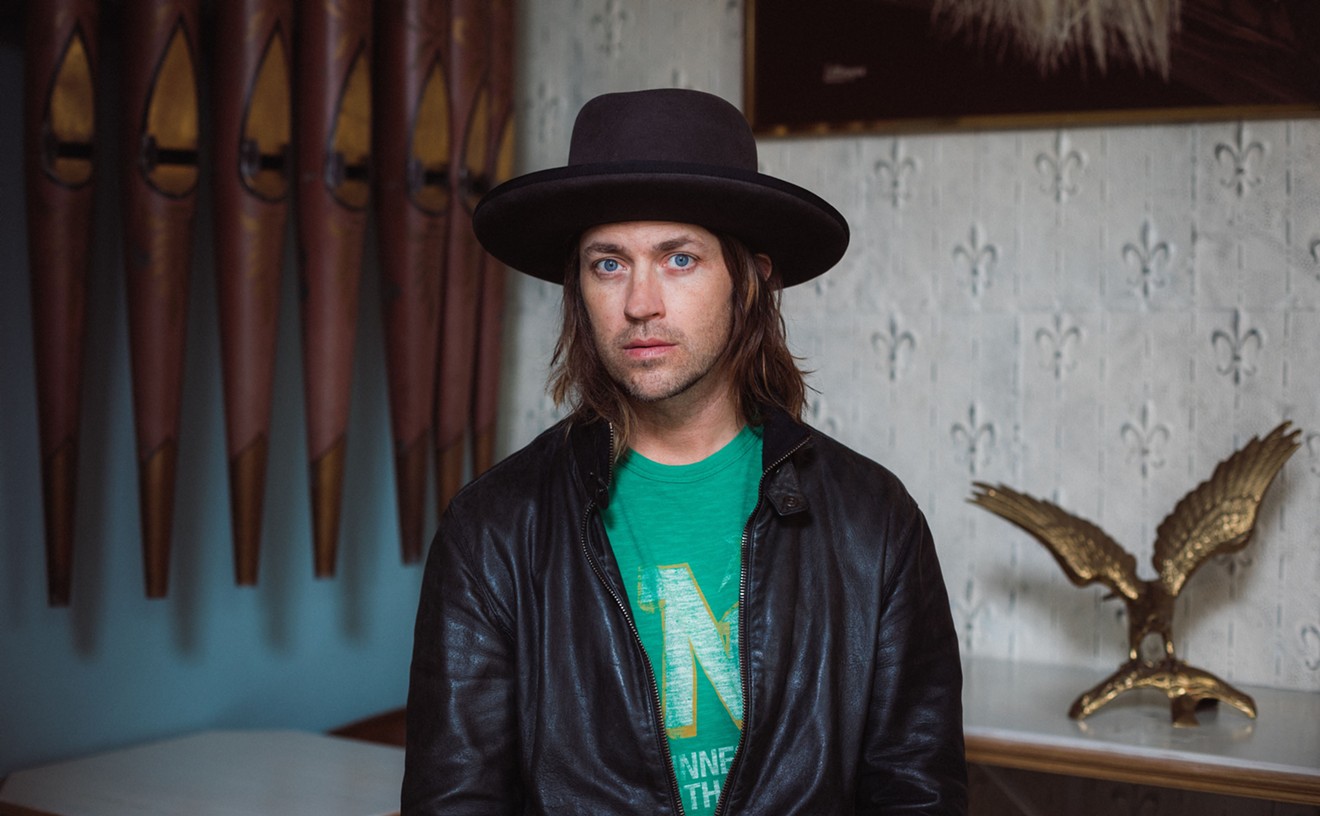Then he ditched the band and broadened his palette; he was using thousands of oils, instead of just a handful of crayons. He dipped a toe and then a foot and then a leg into salsa, wrote soundtracks and symphonies, became a new-wave star on the pop charts, played dress-up jazzer, lost his love for all music then slowly found his way again by making gentle night music. He made albums on which others sang his words, albums on which no one at all sang over his music. He lost his way, lost some (OK, most) of the fans, rebounded with what he believed his best album...and, then, with no warning, climbed into the Wayback Machine to play music with men he'd left behind. Ten years ago, five years ago--damn, one year ago--he said it would never happen. Then it did: Joe Jackson looked back to see from where and with whom he had come, and he didn't turn into a pillar of salt after all.
"This is great fun," says the man for whom wistfulness is more foreign language than foreign concept. "It really is--we're just having a great time. This band had a great chemistry, and it just came back so easily. I think we're all a little bit surprised actually at how well it's worked."
On March 11, Rykodisc will release Volume 4, the first album featuring the Joe Jackson Band since 1980's Beat Crazy. All the boys are back, looking like middle-aged men and blowing like a second wind: the thin and gray Jackson, behind the keyboards and mike; Graham Maby, on bass as he's been on and off for Joe all these years; Gary Sanford on guitar; and Dave Houghton behind the drums. Returned, as well, is the sound they made more than two decades ago--that melodic mishmash of pub reggae and cocktail jazz and Broadway-bound jive and Surrey punk (punk, that is, made by a Steely Dan and Beatles fetishist) that coursed through the throbbing veins of Look Sharp! and I'm the Man in 1979 (though the former was cut in '78) and Beat Crazy and the Tilt EP in 1980. The band was short-lived, busting up after a show in the Netherlands on December 15, 1980; years later, even Jackson would be surprised in retrospect how quickly things had ended.
Mere months ago, Jackson would have "scoffed" at the notion of reunions. To him they seemed silly and sad, the last stabs and last gasps of men trying to jar the memories of fans who'd forgotten about them. They reeked of last chances and lost dollars, money-grabs staged by rock-and-roll thieves running short on opportunities. Christ, the notion of Getting the Old Band Back Together--the stuff of bad movies, the coda of every other Behind the Music horror story--repulsed him. Till one day...
One day, Jackson got to thinking that 2003 would be the 25th anniversary of the recording of Look Sharp!, and he began to believe every man should, on occasion, take a step back before leaping forward. He wondered if the guys would be interested; he doubted they would. He was wrong, and the Joe Jackson Band started playing again in September 2002, at the Marquee in London and the Wedgewood Rooms in Portsmouth; they started over, started older. They played the old songs, the beloved hits: "Is She Really Going Out With Him?," the standard; "It's Different for Girls," the classic; "I'm the Man" and "Got the Time," the rockers; "One More Time," which said it all.
The shows were captured on tape and included as a bonus disc in Volume 4, but Jackson refused to stay in yesterday; he had half a dozen songs he was going to record alone, but felt they would be right for the band. So they went in the studio and emerged with a record that sounds as though but days have passed since last they shared stage and studio. No mere exercise in what-if and what-was, Volume 4 is a perfectly viable release--a little bit of then, a little now, a lot of what Joe did in between.
"There's no way I would've done a reunion where we just went out on tour and played old songs," Jackson says, taking a break from rehearsals days before the band begins a world tour in New Orleans on March 11. "I mean, it would've been so cheesy. I didn't really just want it to be a tasteless exercise in nostalgia. I figured, well, if we reunite this band, there's going to be an element of nostalgia, no matter what, so let's just enjoy that, let's have fun with it. But let's just keep it as an element in something new and not the main course. It's kind of like a side salad of nostalgia."
Jackson refuses to accept his interrogator's theory that this reunion feels in a way organic, something hinted at in recent works that have steered him back toward the beginning. Indeed, he bristles at the notion.
"It's not really that conscious," he says. "It may be that things have been leading in this direction, but I wasn't aware of it. I think that a lot of time, you're working with stuff that...To me, it's mysterious. It comes from the unconscious mind, I guess. I think most artists work in an intuitive way. I don't think we really think, 'Ah, I did that, so next I should do this because that's the logical progression.' I think that's a critic's way of thinking or someone who's assessing it from outside or with hindsight and with things like that."
So, there's no feeling of completing a circle?
"No, I don't really," he says, with proper annoyance at a stupid question. "Because I'm not dead yet."
But the hints have been there nonetheless, the bread crumbs that lead to Volume 4. Consider: In 1999, Jackson published A Cure for Gravity, an eloquent autobiography in which he reviewed, in the third person, Look Sharp! and found it reeking of 1978. "There is no style," he wrote of the album dotted with the influences of jazz and reggae and Latin music and punk and ska and half-buried homages to Steely Dan and Graham Parker. He heard "a guy with eclectic tastes," a man with a strained voice and limited range--but someone also "quite distinctive" nonetheless. Jackson had never before gone back to listen to his old albums--"they're just sort of encoded in my DNA or something," he says today, "by which I mean I don't have to listen to [them]"-- but pulled out the first one and discovered, perhaps to his surprise, he kind of liked it.
A year later, he released two albums that suggested a man turning the car back around. One was Night and Day II, a sort of sequel to the album that sold more than any of his career and spawned the biggest hits he would ever have; it even references "Steppin' Out" as the final song, "Stay," fades out into that familiar piano twinkle. The other disc was Summer in the City, a live album cut with Maby and drummer Gary Burke, on which Jackson mixed old and new and borrowed (from Duke Ellington, Fagen-Becker, Lennon-McCartney...and John Sebastian). On that record, he conjured a sound--that of the small combo with a big grin--strikingly familiar and warmly comforting for the JJ fan who'd fallen out in 1986, when he conjured up the Will Power to go classical; or in 1991, when he extended the peace offering Laughter & Lust; or in 1994 or '97 or 2000, when he resisted pop's advance and started sleeping with a baton.
Nothing in life is inevitable, but Volume 4, with its odes to glam-rock days long since faded and its echoes of reggae and rock and its after-hours piano strikes, at least sounds logical. Jackson's been working his way back to rock, and the audience, for years. It's just been a slow progression, a crawl back after the psychic injury of 1991, when he was burned out and disinterested in listening to music, much less making it.
"In the early '90s I just got really exhausted and burned out and took some time off and had writer's block and got depressed and all kinds of things," he says. "Had generally a rough time of it for a while. And ['94's] Night Music was kind of a way back in. It was the only thing I was capable of doing at that time, as I see it. Other people have seen it differently, you know, because that album really got slagged off. But, you know, for me, the way I saw it was a very gentle and sort of quiet, humble record, which was all I really felt like doing at the time. It was either that or nothing. I had to gradually find my way back. I really lost it for a while, and I had to sort of gradually find my way back into it by trying to reconnect with the music that I really loved and why I was doing this and almost going back to when I first started, when I was 12, 13, 14 years old."
His voice trails off. He hates looking back--the man who wrote a book containing his origin story, the man who has gathered up old mates for another fling.
"I don't know," Jackson begins again. "It's all a bit of a mystery--it's a mysterious thing. But, music for me, when I was a teen-ager, was a sort of intense, teen-age crush, and now it's more like a marriage or something."
Marriages, he is told, certainly have their ups and downs...
"Yeah, they have their ups and downs," he says. "But it's a good marriage."










